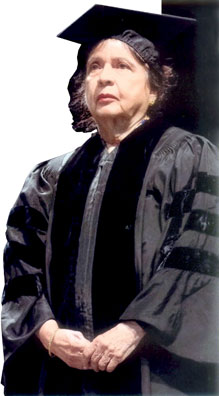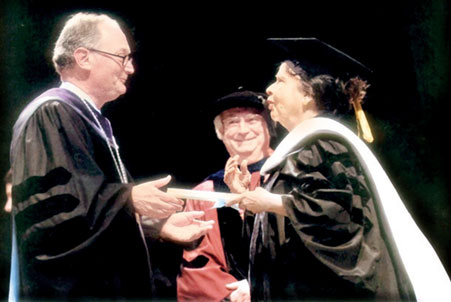US university honours Lankan literary luminary
By Dilshan Boange
Sri Lanka’s annals of literature hold an indelible pedestal for the
name of Jean Solomons Arasanayagam. A prolific poet and prose writer of
ingenuity, her impressive body of work to date has earned her much
recognition as a voice whose craft as a writer reflects rather
significantly the ‘spirit of the age’ in which her artistry in words
takes shape.
 |
|
Jean Arasanayagam at the Bowdoin
College Convocation |
To any student of English literature in Sri Lanka, the name of Jean
Arasanayagam resonates strongly the ‘voice and will’ for Sri Lankan
identity, explored and sought to be resolved within the textual realm of
writing itself.
Through the English literature syllabi at GCE O/Ls and A/Ls at school
level and then in the numerous undergraduate studies at university one
encounters the voice of Jean Arasanayagam; expressive in imagery and
metaphor, steadfast in her beliefs, and in some subtle and gentle way
calling the reader too to awaken the sense of introspection, to gaze
inwards, and ask what it means to be ‘who you are’ in the environs of
history, society, and the innumerable institutions that form our ‘self’.
A graduate of the University of Peradeniya, Arasanayagam also holds
an MA in Linguistics from the University of Stratchclyde in Glasgow,
Scotland. She is a Sri Lankan writer whose works have been translated
into German, French, Danish, Swedish and Japanese. At the convocation
held on May 25 Bowdoin College USA, honoured the Sri Lankan writer of
great distinction with the degree of Doctor of Letters, honoris causa.
The honour conferred upon Arasanayagam can perhaps be thought of as a
feather earned for the identity of Sri Lanka’s growing community of
writers.
The Bowdoin citation
The citation by Bowdoin College says, Arasanayagam “a poetic witness
to social and political history”. The president of Bowdoin College Barry
Mills, on inviting the much admired Sri Lankan writer had said the
following about Jean Solomons Arasanayagam:– “Yours is a voice of
conscience, of experience, of wisdom and of hope. You have given
generously of yourself in encouraging young writers including students
enrolled in the collegiate Sri Lankan education program.” Part of the
program to honour Arasanayagam included a reception at Moulton Union
Bowdoin College that set the ground for interaction with students,
faculty and families which was held on May 24.
Sri Lanka is now at crossroads in the 21st century. Looking to the
future also means remoulding outlook as to what the Sri Lankan ethos
must meet and ‘converse’ with the discourses of a ‘globalising’ world.
The meeting of paths between Bowdoin College and a writer whose work
is the cornerstone in many ways to post independence Sri Lankan
literature, we could surely hope that Sri Lankan expression through
literature is gaining wider recognition.
Just as an ethnic or religious minority in a country may very rightly
seek to have its voice heard and not drowned or diluted under the
larger, more voluminous clamours of a majority, it is fair to say that
in the coming decades one of the concerns among Sri Lanka’s community of
writers in English, would be to see that their writing be given its
rightful share of recognition.
Ethos that has its distinctness rooted in its own nationhood as
opposed to the more commonly understood labels that take a basis of
geography as ‘South Asian’ or ‘Asian’ literature, whereby the
‘regionalist genre’ approach, may, while surely being a strength in some
ways, also deny the ‘Sri Lankan experience expressed through literature’
attention to be noted for its own unique merits.
In this light what Bowdoin College has performed is, reflectively
speaking, a service, symbolically to Sri Lanka’s writers of today.
Civil reciprocity
Lines drawn on water, Jean Arasanayagam’s latest work, is a book of
poetry. The book has been dedicated to Bowdoin College which speaks of a
civil reciprocity in the light of Sri Lankan literature gaining more
recognition among western academia.
The opening of the dedication reads:
“My poetry collection Lines drawn on water is a tribute to Bowdoin
College, Maine, USA which has bestowed on me the honour of Doctorate in
Letters. My personal thanks go to Barry Mills, president of Bowdoin
College and John Clifford Holt, William R. Kenan Jr. Professor of the
Humanities in Religion and Asian Studies.”
 |
|
President of Bowdoin College Barry
Mills presents Jean Arasanayagam with the D.Litt degree, as
Prof. John Clifford Holt looks on. |
Arasanayagam offers the reader insight as to what stirred within her
the inspiration for her book in a preface like essay, bearing as its
heading the title of the book. She speaks of how she had chanced upon
while reading Jungle Tide by John Still. The factor of inspiration
Arasanaygam tells us is to be found in Chapter V (Wild Beasts and Buried
Cities) of Still’s book.
The part that has ‘spoken out’ to and set her thinking in motion is
Still’s record of a rock inscription which bears the nature of a kingly
decree whose author is now unknown to history and thus cast into the
doleful abysses of namelessness, which is truly one of the greatest
fears any writer could have as to what their work could finally serve as
their legacy to posterity. An understandable fear and quite justified
one may say.
‘Immortality’ through the beauty of their creations bequeathed to
their fellow man is what perhaps lies as a subconscious desire in every
artist who ever cared to take means to have his name be ‘authored’ to
his creation.
Milan Kundera the Czech born writer in his novel Immortality speaks
of how artists and politicians pine for immortality through their
legacies left upon this earth.
In this world where impermanence is the one certainty that we may be
assured of, what can guarantee any mortal the stature of immortality to
be endured as long as human memory exists? If even what is ‘carved on
stone’ cannot assure a king, no less, of what he assumed would be
eternal identity and symbolic existence in the eyes of man, what hope
does a writer of today have, Arasanayagam posits the silent question, to
herself, and the reader.
Ever since humankind realised of their one assured common destiny on
this earth is to exit it physically, many a man has sought to find
defiance to mortality through means to create, author or ‘qualify’ into
history.
Ozymandias
When thinking on these lines in the context of what was cited by
Still, which Arasanayagam found to nourish for her creative veins,
Shelley’s sonnet Ozymandias comes to my mind. Fortunately for the ‘King
of kings’ carved out in the lines of Shelley, his name remains to
proclaim itself to the future, he, Ozymandias, never saw, although the
grandiose works he claims exist all around him have turned to dust and
cannot verify the claims of the incomparable greatness the inscription
seeks to establish as its ‘author’s’ doings, or ‘qualifications’, to be
venerated and awed at as deserving immortalisation in history.
It is sadly for that olden king lost to the records of Sri Lankan
history and the memory of man, found as a mere ‘scrap of poetry’ that he
was not awarded at least the kindness that fate had in store for
Ozymandias whose name, at least, endures.
John Still notes of that nameless king that his fate was finally to
be –“like a line drawn on water.”
However much we try to establish with means of ‘identification’, be
it through subscriptions to institutions or authorship over creations
that range from art to architecture, we may rest assured that as
humankind we share with absolute certainty what was articulated by the
late John F. Kennedy –“For in the final analysis, our most basic common
link is that we all inhabit this small planet. We all breathe the same
air. We all cherish our children’s futures. And we are all mortal.”
As a writer whose topics deal very prominently with issues of both
collective and individual identity, Jean Arasanayagam’s self reflection
holds in the subconscious anxieties of ‘what finally will my writing
serve?’ She is arguably a writer who believes her writing must serve
purposes that will contribute to salutary ends.
And while her journey as a writer continues, this milestone in the
nature of the recognition conferred on her by Bowdoin College for her
contributions to the world of letters, will surely, as ‘time’ courses
its passage as a ‘respecter of no persons’, aid to the endurance of her
name.
Arasanayagam is a writer whose body of work deserves its rightful
place in history, and remain in human memory for long time. |

